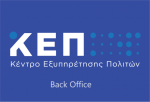
The "Organizational Upgrading and Digital Transformation of the network of Citizen Service Centres (CSCs) and provided services" project focuses on improving the efficiency of the CSCs in the public sector, specifically on facilitating communication and citizen service procedures by public bodies.
GRNET has undertaken the implementation of the sub-project "Information system of the CSCs: KEP Back Office (Support Services) and EU-GO Portal" which includes the modernization of the operation of the CSCs with digital services and ensuring the access of the Single Citizen Service Centres to the EU-GO portal.
More specifically, the aim of the sub-project is to design and develop the back-office information system to support the operation of the Citizen Service Centres (CSCs), which for any reason cannot be served through the digital services of the Single Digital Portal of the Public Administration gov.gr. It also aims to design, develop and implement the new Greek EU-GO platform, to inform and serve EU citizens for the provision of cross-border services of business interest in Greece.
The objectives of GRNET are:
- The replacement of the old information system of the CSCs with a new one, which will be interoperable with other systems and registers of the public sector, such as the National Register of Procedures- Diavlos.
- The update - improvement of the EU-GO portal.
The role of GRNET concerns the design, study and development of the appropriate infrastructure (back end) and the creation of easy-to-use tools (front end) for the employees of the CSCs, resulting in an increase in the number of procedures that can be handled electronically and the rapid electronic circulation of documents, reducing the time needed to satisfy the requests of citizens.
The modernization of the CSCs will be done at multiple levels, bringing the following benefits:
- Provision of tools to CSC employees to perform their work seamlessly through a unified web platform.
- Upgrade of services and simplification of the procedures they are required to carry out on a daily basis.
- Increase in the number of procedures that will be handled electronically, while enabling citizens to move documents electronically without the need to print and/or make copies.
- Interconnection/ interoperability of the individual systems of the Public Administration, such as:
- The Interoperability Centre (ked) of the GSIS
- the Government Portal gr
- The National Register of Administrative Procedures
- the National Communication Register (EMEP)
in order to ensure the automatic retrieval of citizens' data (compliant with the once only principle) and to facilitate the spontaneous, electronic search for individual documents required for the completion of each business procedure.
An additional benefit is the ability of the system to integrate either existing (such as the above infrastructure) or future interoperabilities, which will be developed both inside and outside the scope of this project. The interoperabilities will restore the real-time communication between the public serving authorities.
Finally, the system will be able to gradually provide information on the progress of the digitised procedures in each individual phase, thus giving citizens a clear picture of their transactions with the public authorities at all times.
The project is co-funded by the EEA Grants for the 2014 - 2021 programming period, for the “Good Governance, Accountable Institutions, Transparency” Programme, with the Programme Manager being the Special Management Service of the Digital Transformation 2021-2027 (EYDP PSIMET) of the Ministry of Digital Governance.



